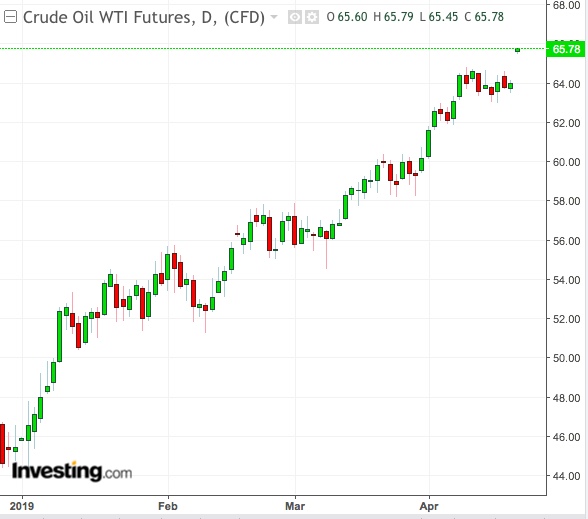U.S. President Donald Trump is doing his utmost to alleviate an upcoming summer squeeze on oil supply by playing to Saudi expectations in banning Iranian oil—while starting a new threat altogether to support a renegade Libyan general, just in case Riyadh doesn’t cooperate in cooling the crude rally.
The question now is what the Saudis will be willing to do for Trump to ensure he doesn’t continue trying to unravel their hard work of the past five months in getting oil prices to where they have come.
With less than two weeks before U.S. sanction waivers on Iranian oil imports expire, the market has been debating over which countries will get their permits renewed, and what volumes they’ll be allowed to buy this time.
Surprise U.S. Move On Iran
But in a stunning development leaked to the Washington Post on Sunday, and also reported by CNN, Secretary of State Mike Pompeo is said to be ready to announce on Monday that import sanctions waivers on Iranian oil, expiring on May 2, will not be extended. A State Department official was quoted saying this was to "drive up the costs of Iran's malign behavior and more strongly address the broad range of threats to peace and security their regime presents”.

Oil prices jumped more than 2% on the news in early Asian trade on Monday, adding to gains achieved in recent months from Saudi-led OPEC production cuts, separate U.S. sanctions on Venezuelan oil and a civil war in Libya. Year-to-date U.S. West Texas Intermediate crude is up 44% while Brent, the global oil benchmark, has gained 37%. Gasoline has rallied even more, by 60%.
In recent months, Trump has been pressuring the Saudis to announce a suspension or ease in OPEC output cuts to cool this year’s oil rally. The president needs lower crude prices to cap a further rise in U.S. motor fuel prices, which may hurt his chances for reelection in 2020. Pump prices of gasoline have risen by around 25% this year.
Six months ago, Trump misled the Saudis and rest of OPEC into pumping more oil on the belief that the U.S. will virtually shut down Iranian production. The president then freely gave away sanction waivers on Iran that flooded the market with crude and caused one of the biggest price crashes within the shortest time in oil’s history.
Hard For Saudis To Ignore Trump
The Saudis have vowed since not to be taken in by Trump again.
Yet, it may not be as easy for them to completely ignore the president’s demands for more OPEC oil, if indeed the State Department holds true to Sunday’s reports in trying to bring Iranian oil exports to zero.
For decades, Riyadh and Washington have had a history of cooperation in curbing Iran's rise as a Middle East power.
They also have other motivations for acting against Tehran.
For the Saudis, it is decades of enmity with a country that ironically counts as one of the most important members of the OPEC cartel.
For Trump, it will be an extension of his mission to punish the Rouhani regime, which he accuses of evil terror deeds and of getting an undeserved deal from his predecessor Barack Obama to export its oil in return for what he deemed too liberal curbs on its nuclear program.
Thus, the more rollback the Saudis make on OPEC production cuts, the harder the Trump administration will likely come down on Iran.
While it has largely achieved its objective of bringing Brent back to near $80 a barrel, Saudi Arabia has held back from announcing any easing in OPEC cuts for fear that the same funds that have supported oil’s climb will drive the market back. OPEC’s partnership with Russia on production cuts has also prompted the Saudis to prioritize Moscow’s interest on this matter over that of the United States—although Russian leader Vladimir Putin is unlikely to fight any decision made by the Kingdom over Iran.
If not to reciprocate the U.S. gambit on Iran, the Saudis might still find it wise to announce a freeze on production cuts to suppress Trump’s creativity in disrupting the oil market.
U.S. President’s Fall Back Plan On Pressuring OPEC: Libya
Prior to Sunday’s news leak, Trump pulled another surprise by indicating U.S. support for Libyan strongman Khalifa Haftar, who’s attempting to displace the North African country’s U.N.-recognized Government of National Accord. The U.S. president’s objective: to prevent the loss of roughly 1.2 million barrels per day of Libyan output from the global market.
Trump’s move to recognize Haftar comes amid the push by the general’s Libyan National Army into west Libya, where an estimated 350,000 bpd is under immediate threat. The LNA also controls Libya’s eastern oil infrastructure, which moves about 700,000 bpd of the country’s oil exports. On Thursday, rival forces attacked a Haftar-controlled airbase on the road to southern fields, which produce about 400,000 bpd.
Trump spoke on the telephone with Haftar last Monday but the White House did not disclose this until markets closed for Good Friday, by confirming that, in the call, Trump
"recognized Field Marshal Haftar's significant role in fighting terrorism and securing Libya's oil resources, and the two discussed a shared vision for Libya's transition to a stable, democratic political system."
Hogan Gidley, a White House spokesman, did not respond to a request for further comment, S&P Global’s energy media unit Platts reported.
But even without more detail, what Trump is doing is clear: holding out both carrot and stick for the Saudis.
How the Kingdom responds will be key to determining if the oil rally continues with force, loses some immediate momentum or pivots altogether in the opposite direction.
